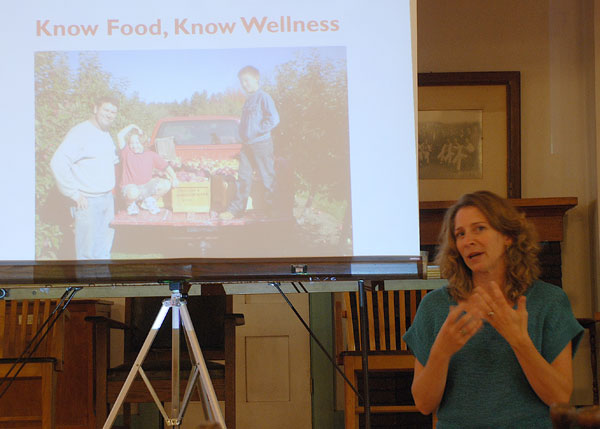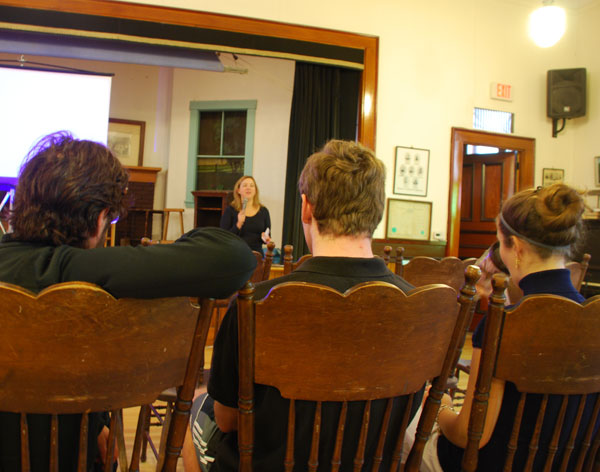
FARMINGTON – There’s progress in the local food movement with farmers now looking to expand their operations because they’re running out of food at the markets, while others are finding creative ways around barriers to the local market. That and other ideas were part of a daylong panel discussion held at the Grange to promote a sustainable local food system in western Maine.
Also announced at the Farmers and Patrons Rights and Responsibilities Conference, a local legislator intends to introduce a bill that would require labeling of genetically modified foods in Maine.
Saturday’s discussion was centered on growing the local food system in the western mountains region. Sponsored by University of Maine at Farmington’s Sustainable Campus Coalition, Food for Maine’s Future and the Farmington Grange, the discussion was designed to align with this week’s FoodDay.org, a nationwide celebration and a movement for healthy, affordable, and sustainable food.
Lillian Lake of Wilton, the development director at Food for Maine’s Future, said the discussion continues to include farmers trying to figure out what the public wants and how much of it to grow, along with supporting UMF’s students who want local food served at the university. Barriers to local farmers include government regulations that can impede a small farmer’s ability to get produce into customers’ hands.
Deb Evans of Bagaduce Farm in West Brooksville near Blue Hill, has bucked the state licensing requirements when it comes to her “extra virgin lard” products that include caramels and soap products.
“I’m the queen of criminal where I live,” she said when it comes to state regulation. She’s kept her operation small and between friends to avoid licensing requirements that include inspections and fees.
Evans renders and uses lard to make her products in her 1830’s era farmhouse. A mobile vendor license isn’t needed because “you don’t need permission to exchange products with a neighbor,” she said.
Lard falls under the meat-handling category so a state’s license for handling potentially hazardous food is usually required.
“I say no,” Evans said, rendering lard doesn’t need a license. She maintains the lard products she sells, along with edible products such as caramels and smoked meats is “an exchange between consenting adults, one that she provides one-on-one contracts for the private individuals who want her products. She also noted warning labels are attached to her products.
“None of the products are sold wholesale or are distributed (commercially),” she said, adding, “It’s illegal, but I don’t care because its right.”
Other barrier issues are that the food grown locally often costs more than vegetables or meats shipped thousands of miles. Improving the technology and training available to farmers may be one answer, but consumers also need to consider what went into making the food they purchased, from a lack of pesticide use to indirect the considerations of land use, farm worker wages and supporting a local economy.
Some farms are finding the increased demand of their product, like the Marble Family Farms is finding, means moving some of their most popular items to the wholesale market by the end of this year, Richard Marble said. Their farm in Farmington specializes in fresh vegetables and homemade bakery items.
The larger issue of locally-grown food is part of a national movement that has been driven by a series of tainted food scares, rising health concerns, fuel prices and a poor economy.
“We need to create workable solutions,” Lake said. “You can go to your local farmers and ask questions. People want safe and healthy food. We want a secure system.”
Wearing a button that read “Extreme Locavore,” Bob Neal of The Turkey Farm in New Sharon, said he always keeps the customer in mind by providing food that is safe and healthy.
“We small farmers are the face on the food,” Neal said. “Accept that the food you eat comes as close to where you live as possible.”

Denise Boothby of Boothby’s Orchard in Livermore, made the argument that raising her four children with husband Rob on their apple orchard farm “influences all dimensions of health.” Being outside, planting, eating food grown fresh from the garden are good for you. Boothby, an instructor in the Community Health Program at UMF, is also a registered nurse.
“That’s the whole thing right there,” she said looking a photo of a kid grinning and holding up an apple. “If kids get to know food and grow their own food, we’d have fewer bad health issues.”
The big applause of the day belonged to Rep. Lance Harvell, R-Farmington, who mentioned that in June he submitted a bill to label GMOs here in Maine. He said, if he is re-elected on Nov. 6, he will be able to continue to work on the bill’s passage.
GMOs or genetically engineered foods have been criticized for causing possible health risks that include tumors and various allergies. Others, including the U.S. Food and Drug Administration, believe it’s not been scientifically proven GMOs are unsafe.
Currently, 21 states are looking at GMO labeling requirement laws. California residents will be voting on a GMO labeling law, Proposition 37, on Nov. 6. The law would require disclosure labels on all foods that contain genetically-engineered ingredients except meat, milk, alcohol or foods sold in restaurants. That state’s decision is likely to be felt nationally, since a lot of the food shipped across the U.S. originates and/or is processed in California.
Harvell said afterward that due to Maine’s relatively small market, he will be seeking a compact with other states that have passed the law, adding, “we’re not going it alone.” California’s passage would bring a fair amount of leverage to an attempt in Maine for passage, he added.
Three states, Vermont, Connecticut and Oregon have recently failed to pass a mandatory GMO labeling law.

Upcoming events of the Food for Maine’s Future include Praise the Lard! A Lard Rendering Class on Nov. 3 from 10 a.m. until noon and 12:30 – 2:30 p.m. at the Sandy River Farm Market, 560 Farmington Falls Road in Farmington. Deb Evans will be presenting her lard rendering class. Pastry, samples of her soap and lard caramels will be available. Class is $10 payable on day of class.





YES – this is the best news I’ve heard in a long time – People need to have a choice on whether to consume GMO foods or not. Labeling will help folks make an informed decision.
I have heard that Kashi is owned by the Kellogg company, and is using GMO soy in many of it’s products. Yet these Kashi products are found in the “All Natural” aisles. Labeling is a must. We should have the right to know if our food has Gentically Modified ingredients. What is Monsanto so afraid of? If they are so proud of what they have created in the food industry – why don’t companies label it as such?
I so agree with AA. We should be supplied with the information necessary to choose in a knowlegeable way what we eat or don’t eat. Whenever vast amounts of money are involved, you cannot trust others to make decisions that are in your best interest. Let’s hear it for labeling that will put the power in the consumer’s court to make the decision for themself.
Way to go Lance this is will be a tough fight but you are up to the task.
I hope this leads somewhere, I try to buy local as much as possible. The things that we consume (and feed are children) are a mystery unless you are buying from your neighbor!
Great to see this–Buying local is the key to our future health and prosperity. Do we really need strawberries shipped in from California in February? Buy from Pikes and freeze them, same with blueberries etc……. Hunt, garden and buy local- the closer any food is to its natural state the better it likely is for you. The more we buy local, the more the prices can compete with the GMO’s and agri-conglomorates that produce the cheapest, and unhealthiest foods.
Hi Lillian,
You should check out the way Massachusetts does their farm co-op thing with their local communities. My kids
are part of this. The pay a local farmer “x” amount of dollars per month to share in the bounty of the produced
goods. The go each week to pick the veggies that are ready and are limited to x number of pounds per veggie
per family for the week, It runs from late spring til late fall. The farm you co-op with grows a good variety of
veggies, the farm limits the shares (number of families) it feels it can support, it is a really well run thing.
You can get milk, cheese, flowers, honey, maple syrup, butter also. Might look at how they have structured as
a model for what you have in mind. It is extremely well received in MA. I would love to be part of this kind of
co-op.
I will ask my kids for the name of the farm co-op they use as I am sure they gave a website you can check out.
Good luck with this exciting project,
Carol McNally
GMO labeling is a must, and a big fight it will be indeed; since the only reason those other states failed to pass such law is likely because of the many millions of dollars that these multinationals are pumping into the opposition against such legislation.. Just look at the numbers from California’s campaign on the issue. I agree; What is Monsanto so afraid of? The logic, backed by the numbers, says it all.
Stay clean of the bribes and you’ll have my back in this fight, Rep. Harvell!
I really hope that this goes through! I feel that people should be able to make a choice on what they are putting into their bodies, and furthermore the consumer should be able to have that information at their fingertips while making their purchases in the grocery store. The only argument that the opposition really has is by them stating that it is going to cost them to add this information to the label well, they can stop complaining. The opposition doesn’t have an argument there because it isn’t that hard to change a label. They change labels all the time when they want to try and make their product label look more appealing and marketable, so this won’t be anything different.